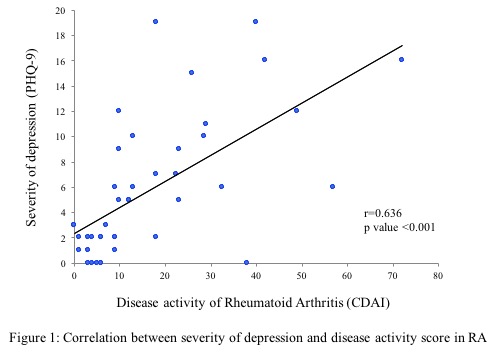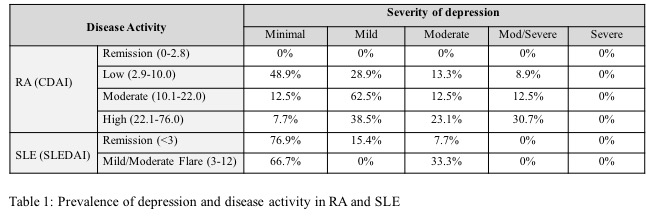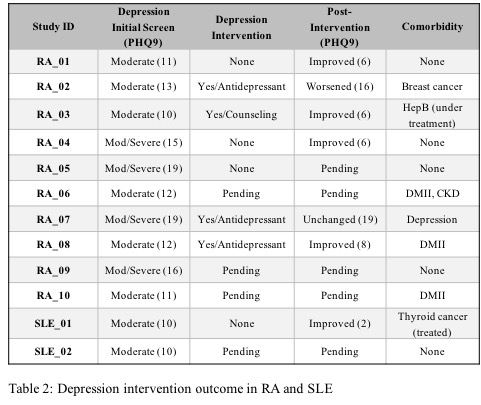Session Information
Session Type: ACR Poster Session B
Session Time: 9:00AM-11:00AM
Background/Purpose: Depression is common and associated with worse outcomes among patients with RA and SLE. Our study assessed depression using Patient Help Questionnaire (PHQ-9) and its correlation with disease activity. We also examined the outcome of intervention on depression score.
Methods: This is a single center cross-sectional study of mainly uninsured patients with RA and SLE in Rheumatology clinic. PHQ-9 scores were collected at each clinic visit. Physicians assessed corresponding disease activity using Clinical Disease Activity Index (CDAI) or SLEDAI. Patients with at least moderate depression (PHQ-9 _10) were offered depression intervention, counseling or medications. PHQ-9 was re-administered after intervention.
Results: 45 RA patients with a mean age of 50 years (±12) and 16 SLE patients with a mean age of 42 years (±11) were screened. In RA group 82% were females with average disease duration of 7 (±6) years. In SLE group 94% were females with average disease duration of 8 (±7) years. Depression was diagnosed in 51% of RA patients: 29% mild, 13% moderate and 9% moderately severe (Table.1). Severity of depression positively correlated with disease activity in RA patients (Figure. 1, Pearson R=0.636, p <0.001). In contrast, depression was diagnosed in 25% of SLE patients: 12.5% mild and 12.5% moderate and did not correlate with disease activity (Pearson R=0.209). RA patients with moderate/high CDAI had significantly higher PHQ-9 than those with low CDAI (7.7 vs 1.5, p<0.001; 9.6 vs 1.5 p<0.001, t-test). Of 12 patients who met criteria for depression intervention (Table. 2), 33% were treated, 33% are pending treatment and 33% declined. With intervention, 2 patients had improved PHQ-9 scores, 1 patientÕs score worsened confounded by cancer surgery, and 1 patient had no change in score.
Conclusion: Our study shows higher prevalence of depression in RA (51%) and SLE (25%) than in general population (7-12%). 1 Correlation between disease activity and depression score is only found in RA. Depression intervention resulted in PHQ-9 improvement in some patients, supporting the benefit of depression screening and treatment in rheumatology practice.
1. Pratt. LA et al. Depression in the U.S. Household Population, 2009-2012. NCHS Data Brief, 2014; No.172.
To cite this abstract in AMA style:
Zhang R, Prakash P, Wasserman A, Sperber K, Ash J. Screening and Intervention of Depression in Rheumatoid Arthritis and Systemic Lupus Erythematosus [abstract]. Arthritis Rheumatol. 2017; 69 (suppl 10). https://acrabstracts.org/abstract/screening-and-intervention-of-depression-in-rheumatoid-arthritis-and-systemic-lupus-erythematosus/. Accessed .« Back to 2017 ACR/ARHP Annual Meeting
ACR Meeting Abstracts - https://acrabstracts.org/abstract/screening-and-intervention-of-depression-in-rheumatoid-arthritis-and-systemic-lupus-erythematosus/



